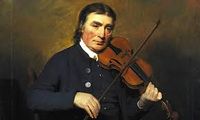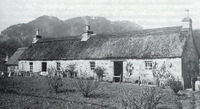Annotation:Landlady of Inver Inn (The)
Back to Landlady of Inver Inn (The)
LANDLADY OF INVER INN, THE. Scottish, "Slowish" March. F Major. Standard tuning (fiddle). AABB. Composed by Scots fiddler-composer Niel Gow (1727-1807). Gow was a life-long resident of Inver, near Dunkeld, Perthshire, Scotland. According to local lore, poet Robert Burns visited Gow at his cottage in Inver in 1787, from which they adjourned to the Inver Inn. While there, the story goes, they witnessed an irate woman belaboring her husband, which inspired Burns to compose the following verse:

Ye gods, ye gave to me a wife, out of your grace and pleasure,
To be the partner of my life and I was glad to have her.
But if your providence divine for better things design her,
I obey your will at any time, I'm willing to resign her.
Rather than penning the rhyme, however, Burns is said to have used a diamond pencil in his possession to scribe it onto a window pane at the Inn. Some time afterwards the pane was broken in an attempt to preserve it. Colorful as the story is, it nontheless is untrue, for the rhyme appears in a song from John Coffey's ballad opera The Devil to Pay, or the Wives Metamorphos'd (1731, Act 1, Air IV), sung by the character Sir John. The opera was performed at Drury Lane in 1732, but was based on the earlier play by Thomas Jevon called The Devil of a Wife (1686). The song appears in John Simpson's Calliope, or English Harmony (London, 1746).

Source for notated version:
Printed sources: Carlin (The Gow Collection), 1986; No. 595. Gow (The First Collection of Niel Gow's Reels), 1787 (revised 1801); p. 27.
Recorded sources:
Back to Landlady of Inver Inn (The)
